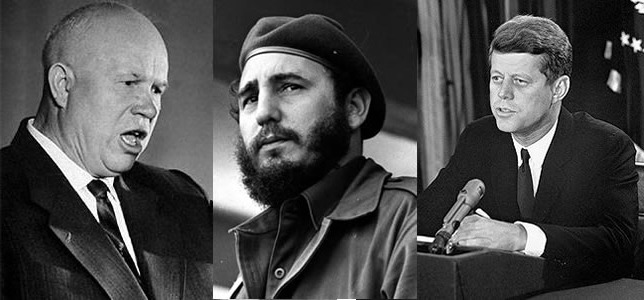The Cuban Missile Crisis

In 1959, Fidel Castro seized control of the island nation of Cuba, a mere 90 miles from the American mainland. Shortly after the coup, Castro declared Cuba a Communist nation and began forging a tight relationship with the Soviet Union.
Concerned about the proliferation of Communism, in April of 1961, the U.S.-backed Bay of Pigs Invasion proved to be an enormous disaster, further straining Cold War tensions between the Soviet Union and the United States.
In response, in 1962, the Cubans and Soviets began secretly building nuclear missile sites on Cuba, which would offer the Soviet Union an unprecedented first strike capability against the Americans. On Oct 15th, US intelligence personnel discovered the existence of Russian nukes on Cuba, prompting President John F. Kennedy to mandate a naval blockade against any Soviet ship approaching the island nation.
JFK Declares Cuban Missile Crisis
On October 22, Kennedy announced a threat to the nation, causing widespread panic across North America. After the Soviets refused to acknowledge the existence of any missiles on Cuba, the United States began to initiate the early stages of an invasion plan.
On Oct 25, the Soviets challenged the blockage for the first time, eventually turning away from Cuba in the face of superior US naval strength and determination. On that same day, Adlai Stevenson, the US Ambassador to the United Nations confronted the Soviets in the UN General Assembly, revealing U-2 spy plane photographs which forced the Soviets to admit that the missile bases existed.
The crisis finally ended on October 28th when JFK and Soviet Premier Nikita Khrushchev reached a secret agreement, which called for the removal of Soviet missiles on Cuba in exchange for the removal of US missiles in Turkey, which posed an equal geographic threat to Russia and her Eastern Bloc satellites. To this day, the Cuban Missile Crisis is regarded as the closest the United States has ever come to nuclear war, as well as a defining moment in the Cold War’s ongoing threat of mutually-assured destruction.
